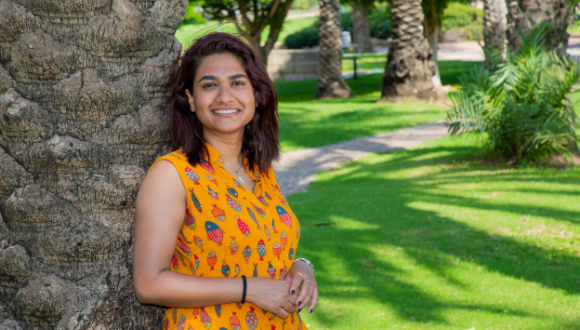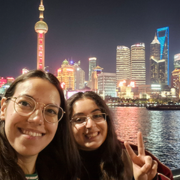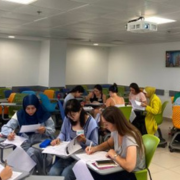Souvenirs of Sand and Sun
Sugandh P. Ojha, an international student from India, shares insights from her time at TAU
It was thrilling to receive my acceptance letter from Tel Aviv University. As an International Relations graduate with an interest in global security, it was a dream-come-true moment. At 25 years old, with two years of work experience under my belt as a journalist in my native India, I saw it as a perfect plan: to explore an often misinterpreted country such as Israel. I already had a great impression of the country through articles I'd read and YouTube videos.
Upon my arrival, I rented an Airbnb for my first few days with a classmate from the U.S. By chance, the owner had cousins from Russia visiting as well. My very first interaction in Israel started with a conversation about the World Wars, the reunification of Jewish families, and how these folks found each other later in life, each assuming the others had died in World War II! From that moment, I knew I was going to have an enriching global experience in this country.
Israel hasn't disappointed me in that regard. After a week, I moved into a beautiful studio apartment in the Millie Phillips Student City complex on the TAU campus. Our welcome session was organized by the TAU International Student Life Team and held at the Sarona Beer Garden —an absolutely breathtaking bar which epitomizes the Tel Aviv lifestyle.
Israel is where the Bible took place. Even if a person is not religious (which I am not), it is a very mystical experience to live in a place that is a holy land for the three Abrahamic faiths. Beyond religion, Israel is a melting pot of cultures where Jews from over 80 countries made aliyah to settle in their homeland, importing their diverse traditions and recipes with them. I see this diversity as I walk Tel Aviv's streets: I witness food vendors serving different cuisine including Syrian, European and Moroccan; people dressed in different traditional styles wearing kippas and headscarves; and people of different nationalities speaking mostly in Hebrew.
I also often witness Arab and Jewish Israelis eating the same food at the same place, which shows more than anything how they coexist in this tight-knit society. These people of multiple identities are united by the strong emotion that they belong in this country; I know this because of the many conversations I’ve had with different Israelis. Even members of the younger generation feel attached to this land and feel safer here than anywhere else.
Tel Aviv is an amalgamation of old-world culture and next-gen lifestyle. You see traditions such as Shabbat—wherein Orthodox Jews refrain from using electricity and gadgets on weekends—alongside modern nightlife. Clubbing is a favorite Israeli pastime, for example.
My first semester courses included field trips which gave us a comprehensive understanding of Israel’s culture, politics socioeconomic structure and regional threats, as well as people, food and most important, wine from the Golan Heights! From these experiences, I can attest that the best way to learn about a country is to visit places and live like a local.
The most memorable experience I had was a Shabbat dinner at Israel's first kibbutz, Deganya. The community functions as a family. As I entered the kibbutz's dining hall, the room felt like a museum, adorned with old pictures showing the community's establishment and its first inhabitants from more than 100 years ago. Israelis are very close to their history, and it was touching to hear the kibbutzniks share their stories! The way people welcomed me in the community made me feel at home; eating with everyone at the same table full of countless dishes was a heart-melting experience. The dining hall was a huge room with tables seating 20 people each which means around 100 people can eat there at once. Sounds crazy during the COVID-19 era right? I’m glad I could experience it before the virus ruined the beauty of togetherness.
Israel is a very eco-friendly country. Compared to Indian cities such as Mumbai and Delhi, the pollution level is low. Electric scooters and bicycles are very popular. The buses, trains and cabs are also excellent modes of transport, and the country is well-connected by an easy-to-use transportation network.
Living on campus, the Carmel Market and the Jaffa Flea Market are nearby, must-visit places to buy cheap products and beautiful souvenirs; these markets also have the best collection ofmamash taim(truly delicious) spices and candies in town!Even if you are not buying anything, visiting these places on Fridays before Shabbat is a fun experience, watching people singing and playing instruments on the streets.
What will I miss most about Israel? Tahini and shawarma; hummus and lip-smacking Arabic desserts—knafehto name one! Most of all, I'll miss the amicable people, with whom you can talk in any situation, whether you are stuck in an elevator or enjoying the beach—it doesn't matter if you know them or not!
The author graduated with a Master's degree from TAU International in 2020.





